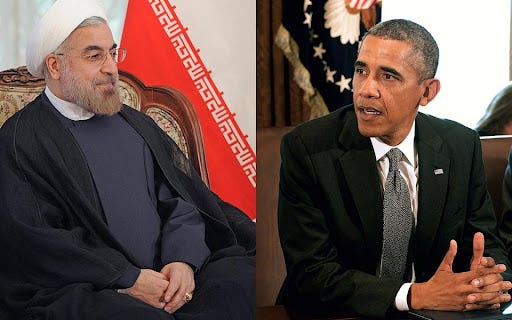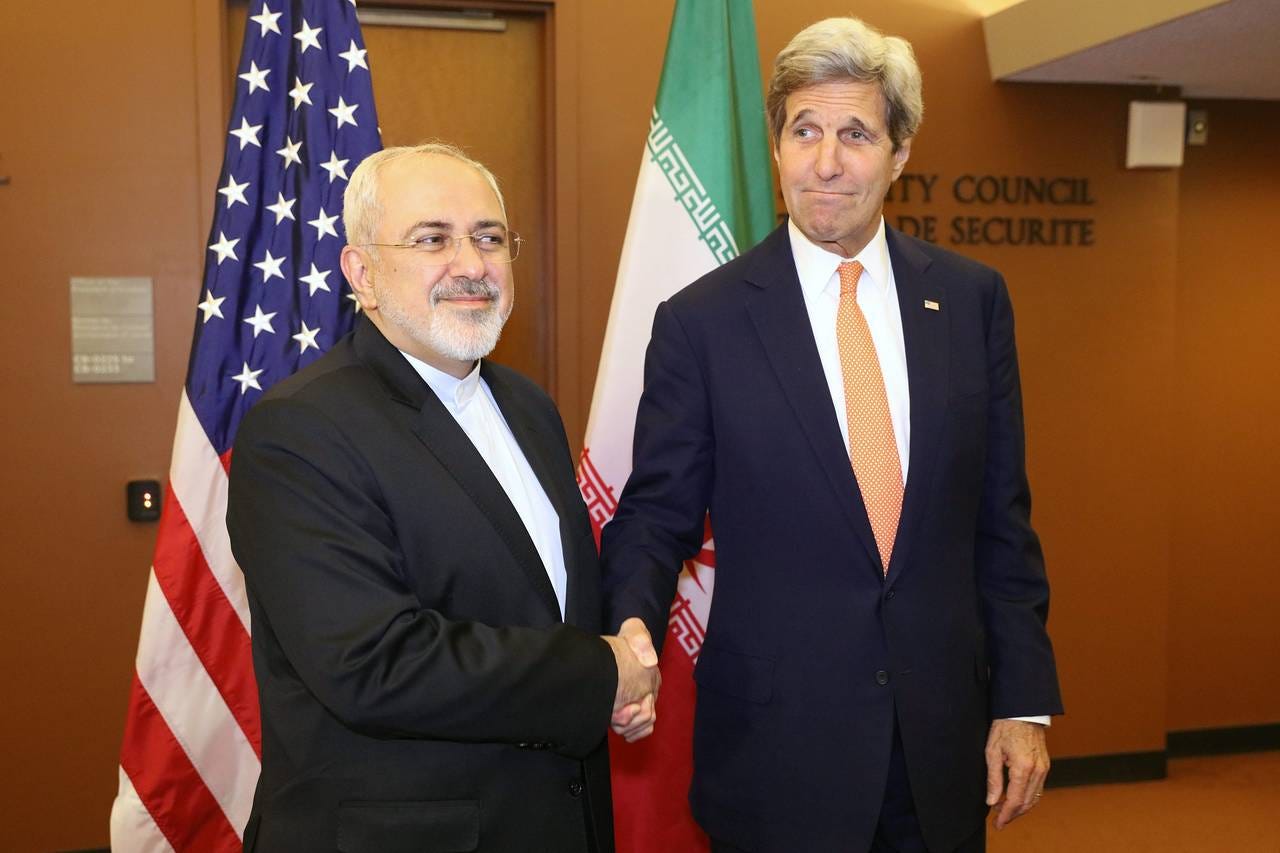The End of Foreign Policy Obamaism?
The strikes on Iran’s nuclear program may have delivered the fatal blow to the Obama foreign policy worldview.
The world’s attention has rightfully been consumed by the Israeli strikes on the Iranian regime and its nuclear capabilities. This is a level of conflict in the Middle East that has not been seen for nearly two decades, with outright combat between what are arguably the region’s two most powerful actors. The fight between Jerusalem and Tehran has been live since the Iran-backed atrocities of October 7, 2023; Israel’s weeks-long obliteration of the Iranian military is merely the latest response in an ongoing defensive war. As the days dragged on and Israel continued to exert aerial and intelligence dominance over Iran, the big question was whether America would get directly involved. Significant contingents on both left and right argued that any American intervention would inevitably lead to yet another “forever war” and get us even more deeply entangled in a region that has monopolized our attention for far too long. But the president chose not to listen.
Last weekend, the US executed a near-flawless strike on the Iranian nuclear facilities in Isfahan, Natanz, and Fordow – the latter of which was buried hundreds of feet underneath a mountain – using B-2 bombers and the 30,000-pound Massive Ordnance Penetrator (MOP) bunker buster bomb. The combined damage to the Iranian nuclear program from this strike and the multi-day Israeli assault is dramatic. The regime has seen its nuclear ambitions, ballistic missile program, internal hierarchy, and military infrastructure ruined in a mere twelve days, primarily by the Israelis with American backing. As of this writing, a ceasefire has been declared by Washington and accepted by both Jerusalem and Tehran. Although the Iranians almost immediately violated the ceasefire by attacking an apartment building in Beersheba, the tenuous peace has largely held.
The past fortnight of military action has forever changed the region and the world, showing Iran to be a second-rate power when shorn of its terrorist proxies, vastly degrading an accelerating nuclear weapons program, and creating a new and powerful disincentive to future nuclear proliferation. It has shown that precise and decisive American military action can advance the national interest, aid our allies, and eliminate threats, all without causing endless war, necessitating boots on the ground, or resulting in a nation-building experiment. In short, it has completely obliterated the regnant liberal foreign policy worldview that found its apotheosis in the Obama administration.
During those eight years, we were repeatedly lectured about the unexceptional nature of America, how our intervention abroad was almost always counterproductive, and that we needed to make concessions to enemies to ensure peace. We were told that Iran’s malign regional activity – including the killing of more than 1000 American servicemen across decades – was due to US support for Israel and our own regional meddling. We were told that for America to leave the Middle East behind and execute the long-awaited pivot to Asia, we needed to boost Tehran as a counterbalance to Jerusalem. We were told Iran could be worked with like any other country and that it sought nuclear development purely for peaceful purposes. We were told that the only way to effectively limit the Iranian nuclear program, stop weaponization, and forestall total war was to make a deal with the mullahs. That the deal would expire, granting the program legal legitimacy, and did not preclude Iranian ballistic missile development or regional terrorism were simply the price to avoid catastrophe. We were told that our traditional allies in Israel and the Gulf states were the source of the Middle East’s problems, not Iran. And we were told that any approach that sought to leave the JCPOA and instead constrain Iran via sanctions or military force would inevitably lead to another Iraq-style quagmire and forever war.
The past two weeks have conclusively dismantled that entire worldview.
In reality, the Obama foreign policy vision on Iran was fatally flawed from the start. It relied on bogus assumptions, like the idea that Tehran would operate in good faith and not cheat on the nuclear deal, as well as the supposition that the built-in sunset mechanisms would be irrelevant given the peaceful intentions of the mullahcracy. Neither of those were true; Iran continued its nuclear program through the years in which the JCPOA was active and it only accelerated its quest for regional hegemony over the past decade. It was already clear that Iran was in direct violation of the deal all the way back in 2016, less than a year after its signing. The repudiation of this faux treaty during the first Trump term only removed active constraints on Washington, not Tehran.
The JCPOA itself was a huge boon to Iranian regional ambitions and a slap at Israel. Iran used the massive funds unlocked by the deal to supply its terrorist proxies across the region, build out an extensive military manufacturing sector focusing on drones and ballistic missiles, and proliferate its anti-Israel mission throughout the world. Those funds allowed Iran to help Hamas build its infamous tunnel infrastructure, provided the Houthis with anti-ship missiles, and bolstered the Iranian satraps in Syria and Lebanon – all of which culminated with the barbarities of October 7. During the Obama and Biden administrations, Israel was treated with undue hostility and repeated symbolic and real actions meant to distance Washington from Jerusalem, even after the 10/7 attacks. All of this was intended to weaken Israel and our bilateral ties, while privileging Iran as a balancing force against what the Democrat foreign policy elite still see as a negative force. But the strengthening of Iran via diplomacy did not lead to peace; it incentivized war.
The war that came, however, was something of a rout – once again, contra Obamaworld. The direct conflict between Israel and Iran lasted only 12 days and America’s participation was limited to less than half an hour in Iranian airspace. In that brief window, the Iranian nuclear program was decimated, the regime’s military infrastructure was degraded, and American B-2 pilots did not face even a single enemy response. The regime has been dramatically weakened by these American-Israeli strikes, with the Supreme Leader in hiding, its external power projection capability obliterated, and its internal control undermined. But what of the vaunted retaliation capabilities of the Iranian regime? Not only did the US face just a small barrage of easily-intercepted missiles shot at a well-defended airbase, but the attack was telegraphed in advance by Tehran. As of now, a fragile ceasefire holds, despite multiple Iranian violations thereof. But the intense phase of the combat has largely abated, less than a month after it started, with no American involvement but for a lone bombing sortie. A forever war this was not.
The past fortnight has shown that the regional power to bet on is Israel, not Iran. Despite its significant disadvantages in terms of geography and manpower, Israel has punched way above its weight. Jerusalem’s technological, intelligence, and aerospace superiority over Tehran is demonstrable – the Israeli Air Force essentially controlled Iranian airspace for almost two weeks. The precision, timing, and power of the Israeli attacks have been overwhelming, with the IDF and Mossad operating with impunity inside Iran itself. Iran has been laid bare as a paper tiger that, when shorn of its terrorist proxies, has nary a leg to stand on militarily. It has never been a force for regional stability, in spite of Obamaworld’s protestations, but now it is barely able to act as a force for regional instability. The denuding of the Iranian threat allows the potential for a new regional security architecture, built around the Abraham Accords, to emerge. If these strikes are followed up by an expansion of that diplomatic concert, the US may actually be able to finally shift focus to countering Chinese belligerence in the Indo-Pacific, while also removing a CCP ally from the geopolitical playing field.
The Obamaites are still in disbelief about the utter collapse of their entire foreign policy worldview and have been flailing online ever since. Former administration officials like Ben Rhodes and John Kerry have been desperately trying to undermine and downplay the success of these strikes, arguing that only diplomacy can successfully end the Iranian nuclear program. They are still pushing the same failed narrative, despite it being so painfully disconfirmed by reality. But they were – and are – wrong about everything. They were wrong about the potential for Iranian good faith in negotiations. They were wrong about the relative strength of Tehran versus Jerusalem. They were wrong about the viability of limited and precise military action to forestall a rogue regime going nuclear. And they were wrong about the core issue: Iran’s profound malignity.
These strikes have put foreign policy Obamaism on life support. And the best part? The men who proved them wrong were the two they despise more than anything else: Donald Trump and Benjamin Netanyahu. Talk about poetic justice.




Another great piece. Thank you!